Entrepreneurship and Small Business Management Skills Assessment
VerifiedAdded on 2021/02/21
|12
|3665
|227
Report
AI Summary
This report provides a comprehensive overview of entrepreneurship and small business management, covering various aspects such as entrepreneurial ventures, their relation to the typology of entrepreneurship, and the impact of small and micro businesses on the economy. It examines the characteristics and skills of successful entrepreneurs, differentiating them from other business managers, and assesses how entrepreneurial personality reflects motivation and mindset. The report also explores how background and experience can either hinder or foster entrepreneurship, using relevant examples. Furthermore, it delves into the importance of small businesses and start-ups for the growth of the social economy, including the impact of Brexit. The analysis includes discussions on the nature and characteristics of different business types, such as private, sole proprietorship, and partnership, highlighting the critical role of micro, small, and medium-sized organizations in the UK economy. This document is available on Desklib, a platform offering a wide range of study tools and resources for students.

Entrepreneurship
Small Business
Management
Small Business
Management
Paraphrase This Document
Need a fresh take? Get an instant paraphrase of this document with our AI Paraphraser
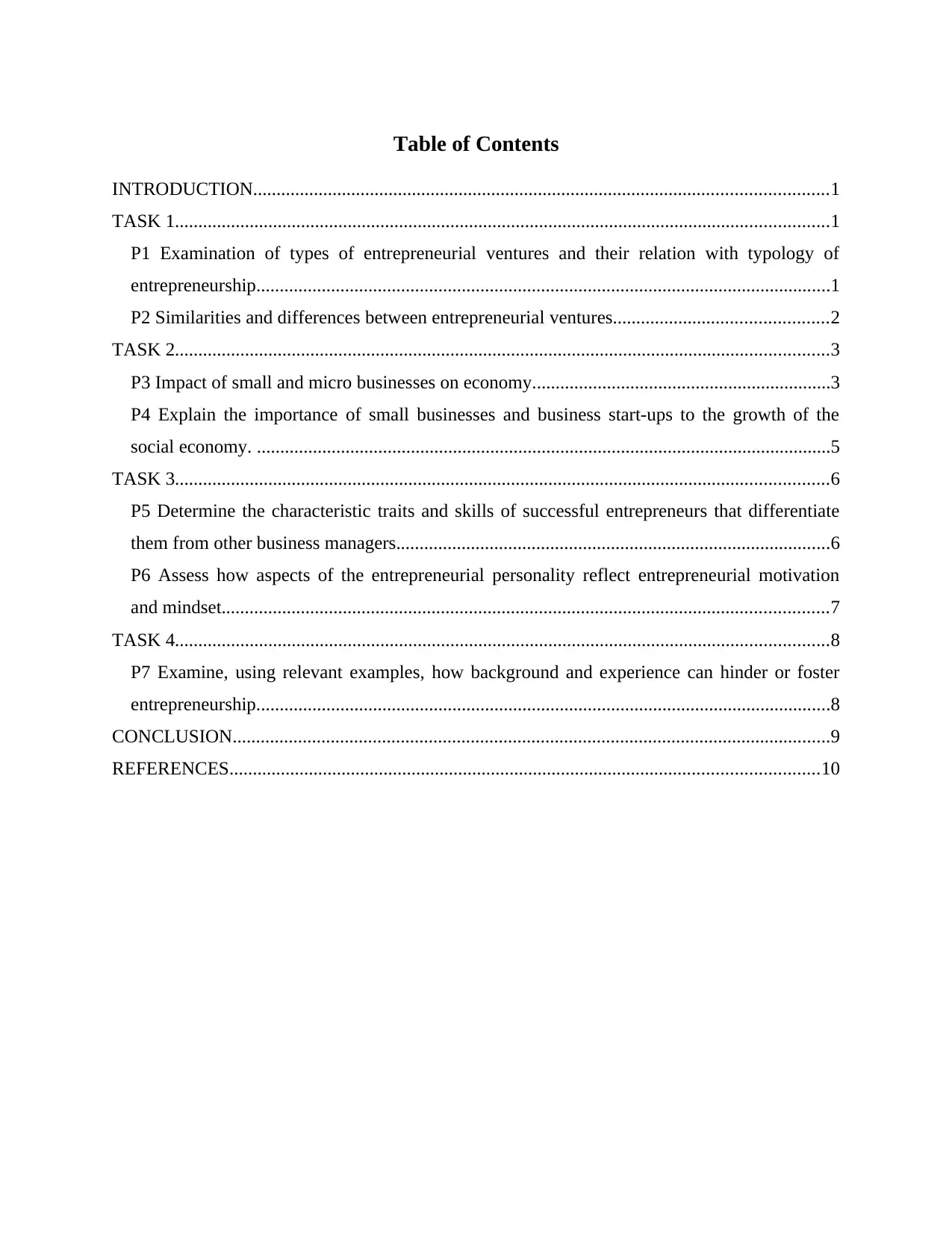
Table of Contents
INTRODUCTION...........................................................................................................................1
TASK 1............................................................................................................................................1
P1 Examination of types of entrepreneurial ventures and their relation with typology of
entrepreneurship...........................................................................................................................1
P2 Similarities and differences between entrepreneurial ventures..............................................2
TASK 2............................................................................................................................................3
P3 Impact of small and micro businesses on economy................................................................3
P4 Explain the importance of small businesses and business start-ups to the growth of the
social economy. ...........................................................................................................................5
TASK 3............................................................................................................................................6
P5 Determine the characteristic traits and skills of successful entrepreneurs that differentiate
them from other business managers.............................................................................................6
P6 Assess how aspects of the entrepreneurial personality reflect entrepreneurial motivation
and mindset..................................................................................................................................7
TASK 4............................................................................................................................................8
P7 Examine, using relevant examples, how background and experience can hinder or foster
entrepreneurship...........................................................................................................................8
CONCLUSION................................................................................................................................9
REFERENCES..............................................................................................................................10
INTRODUCTION...........................................................................................................................1
TASK 1............................................................................................................................................1
P1 Examination of types of entrepreneurial ventures and their relation with typology of
entrepreneurship...........................................................................................................................1
P2 Similarities and differences between entrepreneurial ventures..............................................2
TASK 2............................................................................................................................................3
P3 Impact of small and micro businesses on economy................................................................3
P4 Explain the importance of small businesses and business start-ups to the growth of the
social economy. ...........................................................................................................................5
TASK 3............................................................................................................................................6
P5 Determine the characteristic traits and skills of successful entrepreneurs that differentiate
them from other business managers.............................................................................................6
P6 Assess how aspects of the entrepreneurial personality reflect entrepreneurial motivation
and mindset..................................................................................................................................7
TASK 4............................................................................................................................................8
P7 Examine, using relevant examples, how background and experience can hinder or foster
entrepreneurship...........................................................................................................................8
CONCLUSION................................................................................................................................9
REFERENCES..............................................................................................................................10
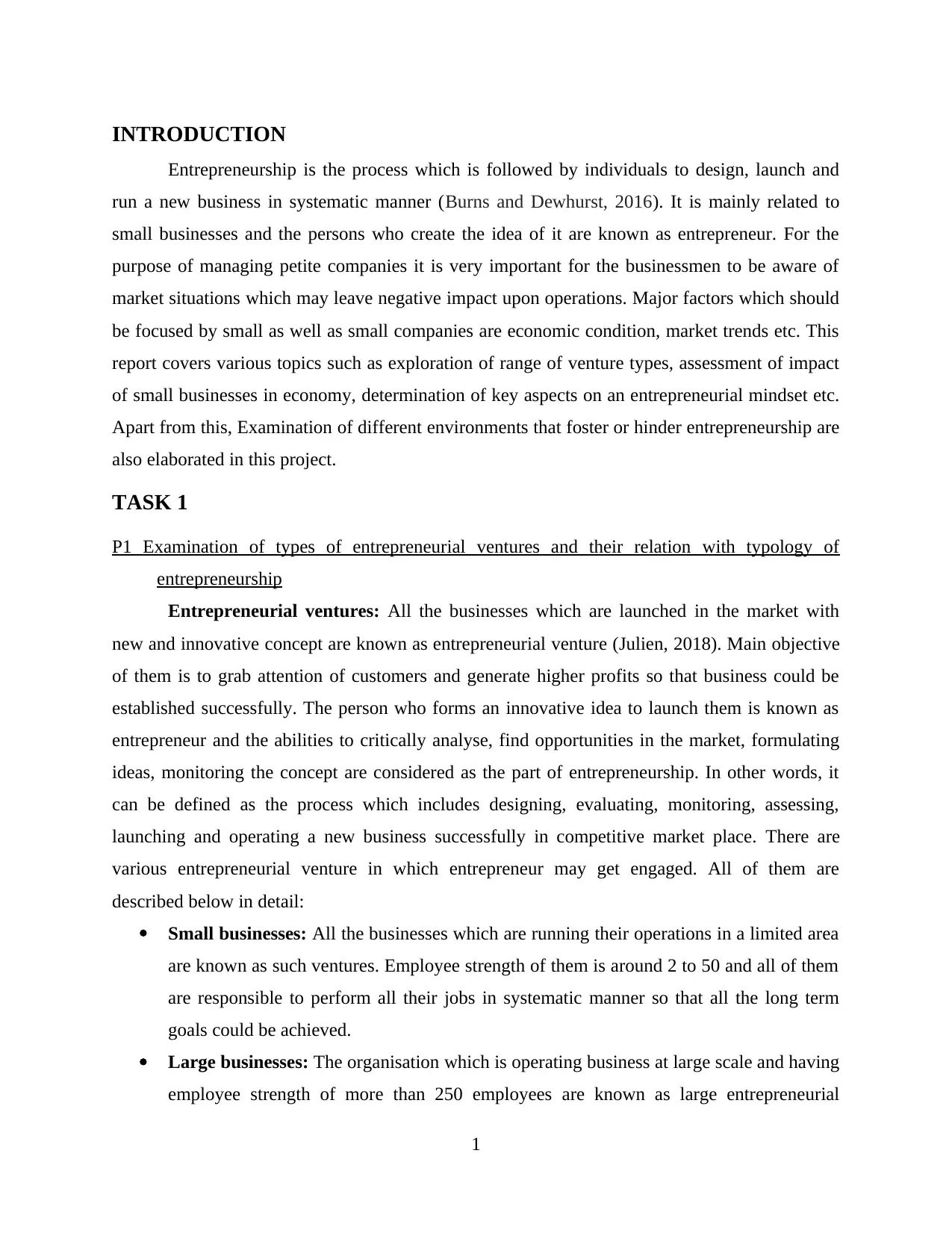
INTRODUCTION
Entrepreneurship is the process which is followed by individuals to design, launch and
run a new business in systematic manner (Burns and Dewhurst, 2016). It is mainly related to
small businesses and the persons who create the idea of it are known as entrepreneur. For the
purpose of managing petite companies it is very important for the businessmen to be aware of
market situations which may leave negative impact upon operations. Major factors which should
be focused by small as well as small companies are economic condition, market trends etc. This
report covers various topics such as exploration of range of venture types, assessment of impact
of small businesses in economy, determination of key aspects on an entrepreneurial mindset etc.
Apart from this, Examination of different environments that foster or hinder entrepreneurship are
also elaborated in this project.
TASK 1
P1 Examination of types of entrepreneurial ventures and their relation with typology of
entrepreneurship
Entrepreneurial ventures: All the businesses which are launched in the market with
new and innovative concept are known as entrepreneurial venture (Julien, 2018). Main objective
of them is to grab attention of customers and generate higher profits so that business could be
established successfully. The person who forms an innovative idea to launch them is known as
entrepreneur and the abilities to critically analyse, find opportunities in the market, formulating
ideas, monitoring the concept are considered as the part of entrepreneurship. In other words, it
can be defined as the process which includes designing, evaluating, monitoring, assessing,
launching and operating a new business successfully in competitive market place. There are
various entrepreneurial venture in which entrepreneur may get engaged. All of them are
described below in detail:
Small businesses: All the businesses which are running their operations in a limited area
are known as such ventures. Employee strength of them is around 2 to 50 and all of them
are responsible to perform all their jobs in systematic manner so that all the long term
goals could be achieved.
Large businesses: The organisation which is operating business at large scale and having
employee strength of more than 250 employees are known as large entrepreneurial
1
Entrepreneurship is the process which is followed by individuals to design, launch and
run a new business in systematic manner (Burns and Dewhurst, 2016). It is mainly related to
small businesses and the persons who create the idea of it are known as entrepreneur. For the
purpose of managing petite companies it is very important for the businessmen to be aware of
market situations which may leave negative impact upon operations. Major factors which should
be focused by small as well as small companies are economic condition, market trends etc. This
report covers various topics such as exploration of range of venture types, assessment of impact
of small businesses in economy, determination of key aspects on an entrepreneurial mindset etc.
Apart from this, Examination of different environments that foster or hinder entrepreneurship are
also elaborated in this project.
TASK 1
P1 Examination of types of entrepreneurial ventures and their relation with typology of
entrepreneurship
Entrepreneurial ventures: All the businesses which are launched in the market with
new and innovative concept are known as entrepreneurial venture (Julien, 2018). Main objective
of them is to grab attention of customers and generate higher profits so that business could be
established successfully. The person who forms an innovative idea to launch them is known as
entrepreneur and the abilities to critically analyse, find opportunities in the market, formulating
ideas, monitoring the concept are considered as the part of entrepreneurship. In other words, it
can be defined as the process which includes designing, evaluating, monitoring, assessing,
launching and operating a new business successfully in competitive market place. There are
various entrepreneurial venture in which entrepreneur may get engaged. All of them are
described below in detail:
Small businesses: All the businesses which are running their operations in a limited area
are known as such ventures. Employee strength of them is around 2 to 50 and all of them
are responsible to perform all their jobs in systematic manner so that all the long term
goals could be achieved.
Large businesses: The organisation which is operating business at large scale and having
employee strength of more than 250 employees are known as large entrepreneurial
1
⊘ This is a preview!⊘
Do you want full access?
Subscribe today to unlock all pages.

Trusted by 1+ million students worldwide
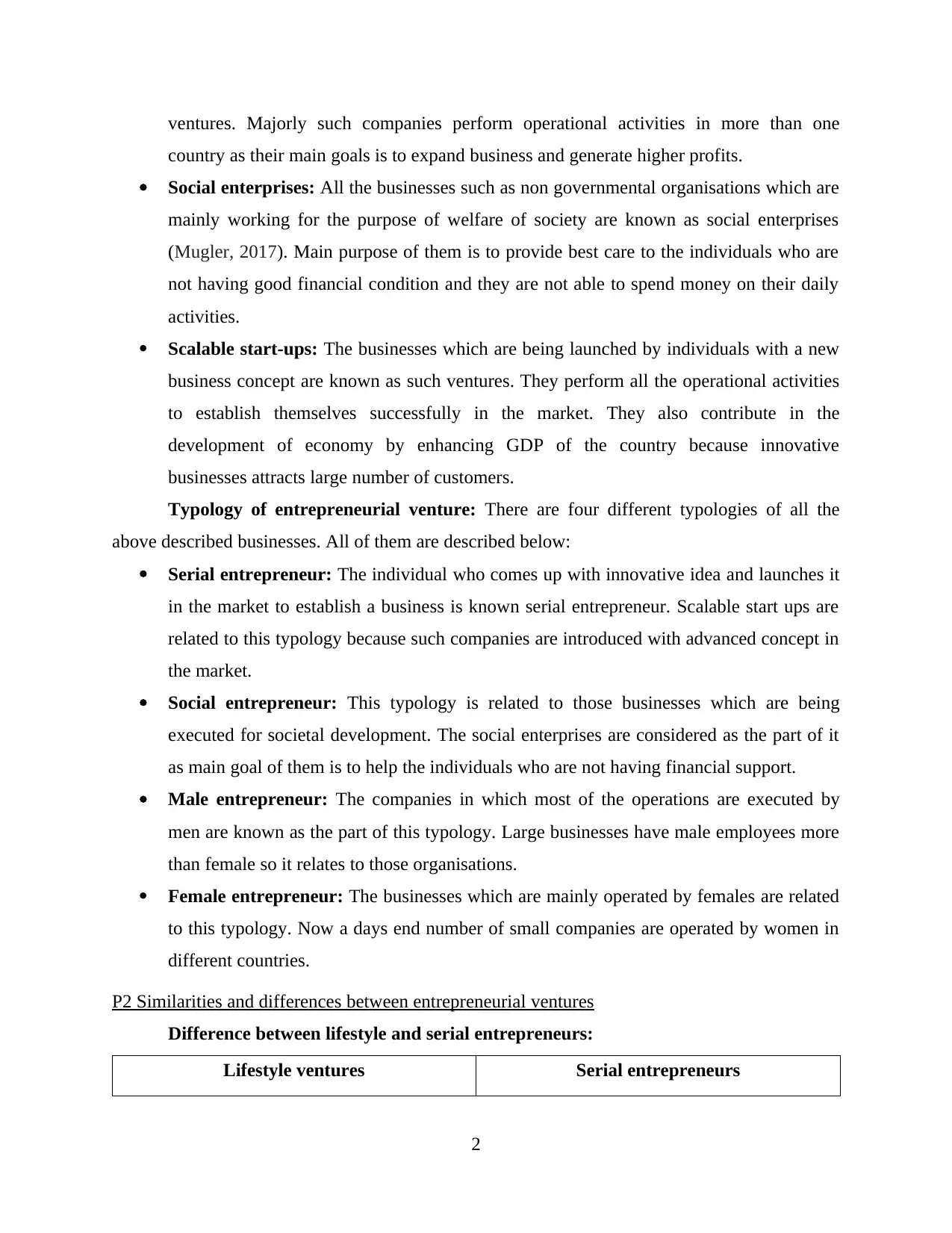
ventures. Majorly such companies perform operational activities in more than one
country as their main goals is to expand business and generate higher profits.
Social enterprises: All the businesses such as non governmental organisations which are
mainly working for the purpose of welfare of society are known as social enterprises
(Mugler, 2017). Main purpose of them is to provide best care to the individuals who are
not having good financial condition and they are not able to spend money on their daily
activities.
Scalable start-ups: The businesses which are being launched by individuals with a new
business concept are known as such ventures. They perform all the operational activities
to establish themselves successfully in the market. They also contribute in the
development of economy by enhancing GDP of the country because innovative
businesses attracts large number of customers.
Typology of entrepreneurial venture: There are four different typologies of all the
above described businesses. All of them are described below:
Serial entrepreneur: The individual who comes up with innovative idea and launches it
in the market to establish a business is known serial entrepreneur. Scalable start ups are
related to this typology because such companies are introduced with advanced concept in
the market.
Social entrepreneur: This typology is related to those businesses which are being
executed for societal development. The social enterprises are considered as the part of it
as main goal of them is to help the individuals who are not having financial support.
Male entrepreneur: The companies in which most of the operations are executed by
men are known as the part of this typology. Large businesses have male employees more
than female so it relates to those organisations.
Female entrepreneur: The businesses which are mainly operated by females are related
to this typology. Now a days end number of small companies are operated by women in
different countries.
P2 Similarities and differences between entrepreneurial ventures
Difference between lifestyle and serial entrepreneurs:
Lifestyle ventures Serial entrepreneurs
2
country as their main goals is to expand business and generate higher profits.
Social enterprises: All the businesses such as non governmental organisations which are
mainly working for the purpose of welfare of society are known as social enterprises
(Mugler, 2017). Main purpose of them is to provide best care to the individuals who are
not having good financial condition and they are not able to spend money on their daily
activities.
Scalable start-ups: The businesses which are being launched by individuals with a new
business concept are known as such ventures. They perform all the operational activities
to establish themselves successfully in the market. They also contribute in the
development of economy by enhancing GDP of the country because innovative
businesses attracts large number of customers.
Typology of entrepreneurial venture: There are four different typologies of all the
above described businesses. All of them are described below:
Serial entrepreneur: The individual who comes up with innovative idea and launches it
in the market to establish a business is known serial entrepreneur. Scalable start ups are
related to this typology because such companies are introduced with advanced concept in
the market.
Social entrepreneur: This typology is related to those businesses which are being
executed for societal development. The social enterprises are considered as the part of it
as main goal of them is to help the individuals who are not having financial support.
Male entrepreneur: The companies in which most of the operations are executed by
men are known as the part of this typology. Large businesses have male employees more
than female so it relates to those organisations.
Female entrepreneur: The businesses which are mainly operated by females are related
to this typology. Now a days end number of small companies are operated by women in
different countries.
P2 Similarities and differences between entrepreneurial ventures
Difference between lifestyle and serial entrepreneurs:
Lifestyle ventures Serial entrepreneurs
2
Paraphrase This Document
Need a fresh take? Get an instant paraphrase of this document with our AI Paraphraser
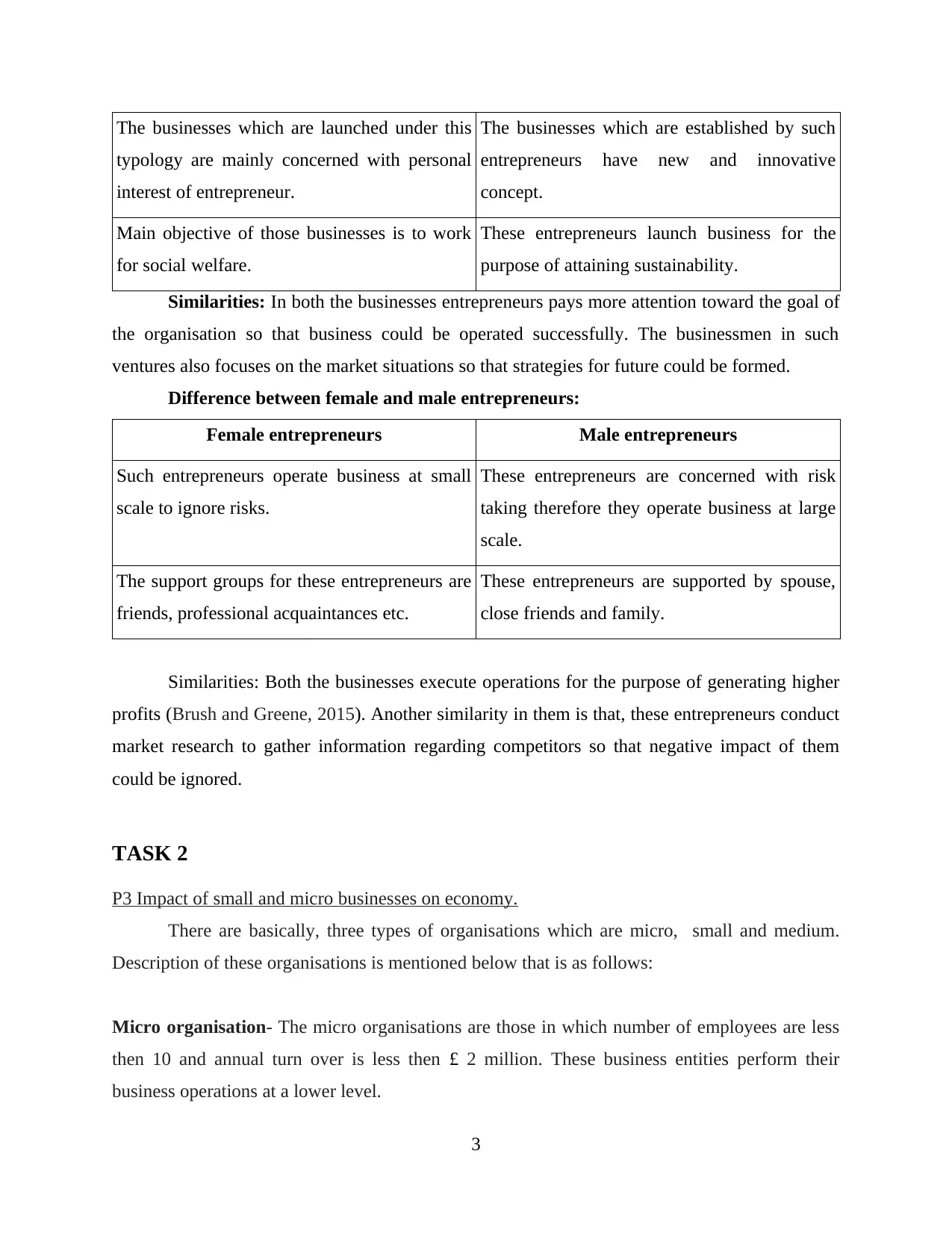
The businesses which are launched under this
typology are mainly concerned with personal
interest of entrepreneur.
The businesses which are established by such
entrepreneurs have new and innovative
concept.
Main objective of those businesses is to work
for social welfare.
These entrepreneurs launch business for the
purpose of attaining sustainability.
Similarities: In both the businesses entrepreneurs pays more attention toward the goal of
the organisation so that business could be operated successfully. The businessmen in such
ventures also focuses on the market situations so that strategies for future could be formed.
Difference between female and male entrepreneurs:
Female entrepreneurs Male entrepreneurs
Such entrepreneurs operate business at small
scale to ignore risks.
These entrepreneurs are concerned with risk
taking therefore they operate business at large
scale.
The support groups for these entrepreneurs are
friends, professional acquaintances etc.
These entrepreneurs are supported by spouse,
close friends and family.
Similarities: Both the businesses execute operations for the purpose of generating higher
profits (Brush and Greene, 2015). Another similarity in them is that, these entrepreneurs conduct
market research to gather information regarding competitors so that negative impact of them
could be ignored.
TASK 2
P3 Impact of small and micro businesses on economy.
There are basically, three types of organisations which are micro, small and medium.
Description of these organisations is mentioned below that is as follows:
Micro organisation- The micro organisations are those in which number of employees are less
then 10 and annual turn over is less then £ 2 million. These business entities perform their
business operations at a lower level.
3
typology are mainly concerned with personal
interest of entrepreneur.
The businesses which are established by such
entrepreneurs have new and innovative
concept.
Main objective of those businesses is to work
for social welfare.
These entrepreneurs launch business for the
purpose of attaining sustainability.
Similarities: In both the businesses entrepreneurs pays more attention toward the goal of
the organisation so that business could be operated successfully. The businessmen in such
ventures also focuses on the market situations so that strategies for future could be formed.
Difference between female and male entrepreneurs:
Female entrepreneurs Male entrepreneurs
Such entrepreneurs operate business at small
scale to ignore risks.
These entrepreneurs are concerned with risk
taking therefore they operate business at large
scale.
The support groups for these entrepreneurs are
friends, professional acquaintances etc.
These entrepreneurs are supported by spouse,
close friends and family.
Similarities: Both the businesses execute operations for the purpose of generating higher
profits (Brush and Greene, 2015). Another similarity in them is that, these entrepreneurs conduct
market research to gather information regarding competitors so that negative impact of them
could be ignored.
TASK 2
P3 Impact of small and micro businesses on economy.
There are basically, three types of organisations which are micro, small and medium.
Description of these organisations is mentioned below that is as follows:
Micro organisation- The micro organisations are those in which number of employees are less
then 10 and annual turn over is less then £ 2 million. These business entities perform their
business operations at a lower level.
3
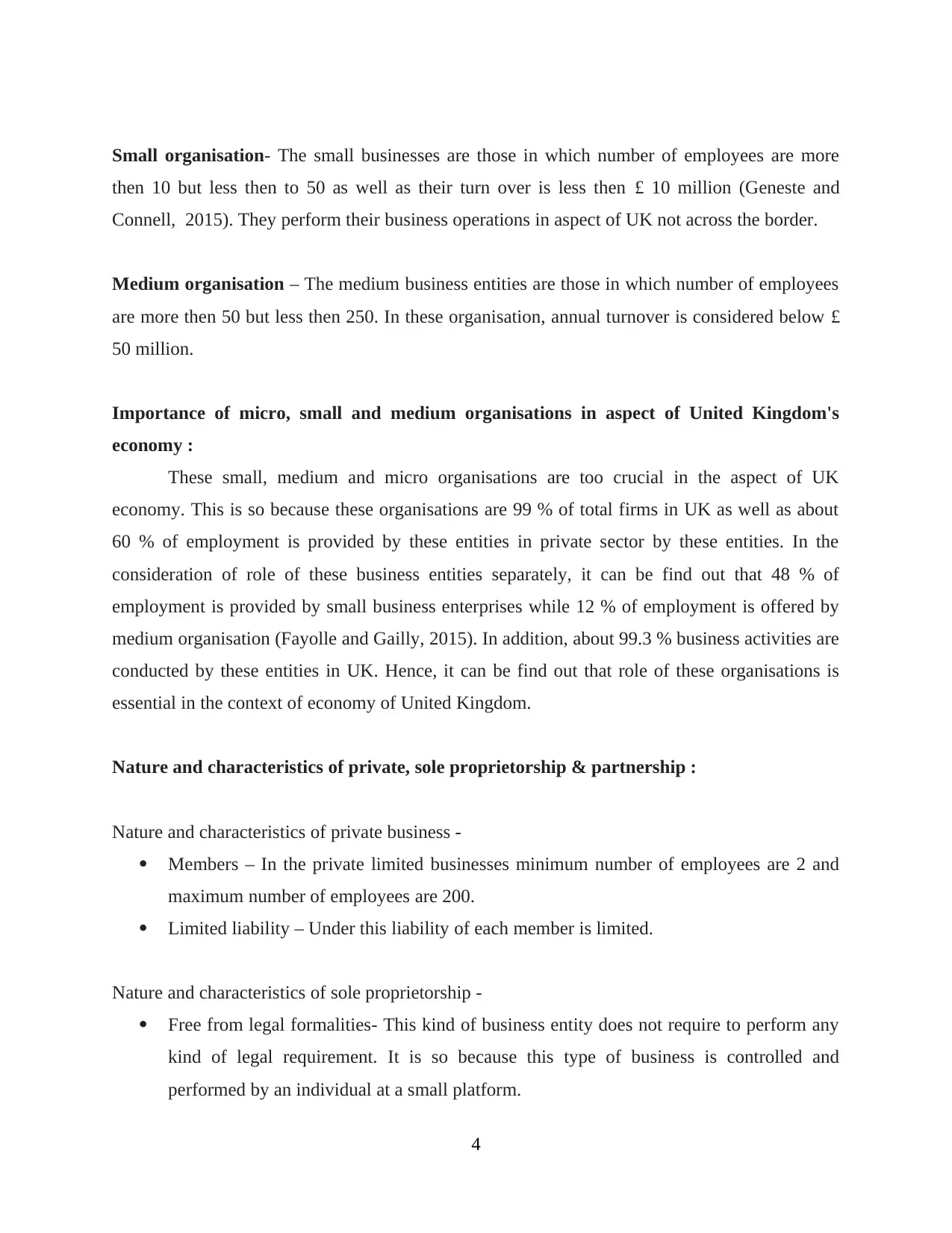
Small organisation- The small businesses are those in which number of employees are more
then 10 but less then to 50 as well as their turn over is less then £ 10 million (Geneste and
Connell, 2015). They perform their business operations in aspect of UK not across the border.
Medium organisation – The medium business entities are those in which number of employees
are more then 50 but less then 250. In these organisation, annual turnover is considered below £
50 million.
Importance of micro, small and medium organisations in aspect of United Kingdom's
economy :
These small, medium and micro organisations are too crucial in the aspect of UK
economy. This is so because these organisations are 99 % of total firms in UK as well as about
60 % of employment is provided by these entities in private sector by these entities. In the
consideration of role of these business entities separately, it can be find out that 48 % of
employment is provided by small business enterprises while 12 % of employment is offered by
medium organisation (Fayolle and Gailly, 2015). In addition, about 99.3 % business activities are
conducted by these entities in UK. Hence, it can be find out that role of these organisations is
essential in the context of economy of United Kingdom.
Nature and characteristics of private, sole proprietorship & partnership :
Nature and characteristics of private business -
Members – In the private limited businesses minimum number of employees are 2 and
maximum number of employees are 200.
Limited liability – Under this liability of each member is limited.
Nature and characteristics of sole proprietorship -
Free from legal formalities- This kind of business entity does not require to perform any
kind of legal requirement. It is so because this type of business is controlled and
performed by an individual at a small platform.
4
then 10 but less then to 50 as well as their turn over is less then £ 10 million (Geneste and
Connell, 2015). They perform their business operations in aspect of UK not across the border.
Medium organisation – The medium business entities are those in which number of employees
are more then 50 but less then 250. In these organisation, annual turnover is considered below £
50 million.
Importance of micro, small and medium organisations in aspect of United Kingdom's
economy :
These small, medium and micro organisations are too crucial in the aspect of UK
economy. This is so because these organisations are 99 % of total firms in UK as well as about
60 % of employment is provided by these entities in private sector by these entities. In the
consideration of role of these business entities separately, it can be find out that 48 % of
employment is provided by small business enterprises while 12 % of employment is offered by
medium organisation (Fayolle and Gailly, 2015). In addition, about 99.3 % business activities are
conducted by these entities in UK. Hence, it can be find out that role of these organisations is
essential in the context of economy of United Kingdom.
Nature and characteristics of private, sole proprietorship & partnership :
Nature and characteristics of private business -
Members – In the private limited businesses minimum number of employees are 2 and
maximum number of employees are 200.
Limited liability – Under this liability of each member is limited.
Nature and characteristics of sole proprietorship -
Free from legal formalities- This kind of business entity does not require to perform any
kind of legal requirement. It is so because this type of business is controlled and
performed by an individual at a small platform.
4
⊘ This is a preview!⊘
Do you want full access?
Subscribe today to unlock all pages.

Trusted by 1+ million students worldwide
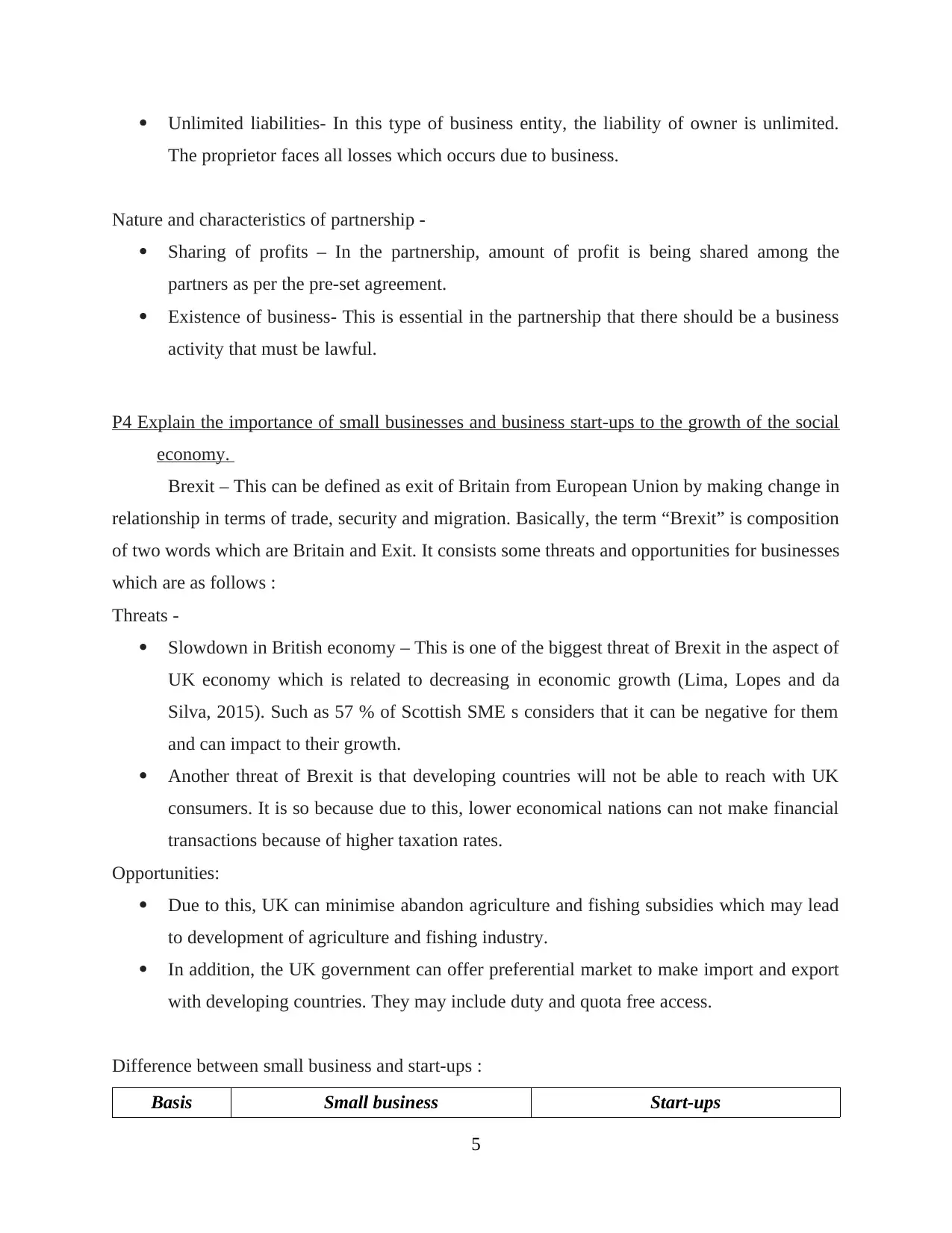
Unlimited liabilities- In this type of business entity, the liability of owner is unlimited.
The proprietor faces all losses which occurs due to business.
Nature and characteristics of partnership -
Sharing of profits – In the partnership, amount of profit is being shared among the
partners as per the pre-set agreement.
Existence of business- This is essential in the partnership that there should be a business
activity that must be lawful.
P4 Explain the importance of small businesses and business start-ups to the growth of the social
economy.
Brexit – This can be defined as exit of Britain from European Union by making change in
relationship in terms of trade, security and migration. Basically, the term “Brexit” is composition
of two words which are Britain and Exit. It consists some threats and opportunities for businesses
which are as follows :
Threats -
Slowdown in British economy – This is one of the biggest threat of Brexit in the aspect of
UK economy which is related to decreasing in economic growth (Lima, Lopes and da
Silva, 2015). Such as 57 % of Scottish SME s considers that it can be negative for them
and can impact to their growth.
Another threat of Brexit is that developing countries will not be able to reach with UK
consumers. It is so because due to this, lower economical nations can not make financial
transactions because of higher taxation rates.
Opportunities:
Due to this, UK can minimise abandon agriculture and fishing subsidies which may lead
to development of agriculture and fishing industry.
In addition, the UK government can offer preferential market to make import and export
with developing countries. They may include duty and quota free access.
Difference between small business and start-ups :
Basis Small business Start-ups
5
The proprietor faces all losses which occurs due to business.
Nature and characteristics of partnership -
Sharing of profits – In the partnership, amount of profit is being shared among the
partners as per the pre-set agreement.
Existence of business- This is essential in the partnership that there should be a business
activity that must be lawful.
P4 Explain the importance of small businesses and business start-ups to the growth of the social
economy.
Brexit – This can be defined as exit of Britain from European Union by making change in
relationship in terms of trade, security and migration. Basically, the term “Brexit” is composition
of two words which are Britain and Exit. It consists some threats and opportunities for businesses
which are as follows :
Threats -
Slowdown in British economy – This is one of the biggest threat of Brexit in the aspect of
UK economy which is related to decreasing in economic growth (Lima, Lopes and da
Silva, 2015). Such as 57 % of Scottish SME s considers that it can be negative for them
and can impact to their growth.
Another threat of Brexit is that developing countries will not be able to reach with UK
consumers. It is so because due to this, lower economical nations can not make financial
transactions because of higher taxation rates.
Opportunities:
Due to this, UK can minimise abandon agriculture and fishing subsidies which may lead
to development of agriculture and fishing industry.
In addition, the UK government can offer preferential market to make import and export
with developing countries. They may include duty and quota free access.
Difference between small business and start-ups :
Basis Small business Start-ups
5
Paraphrase This Document
Need a fresh take? Get an instant paraphrase of this document with our AI Paraphraser
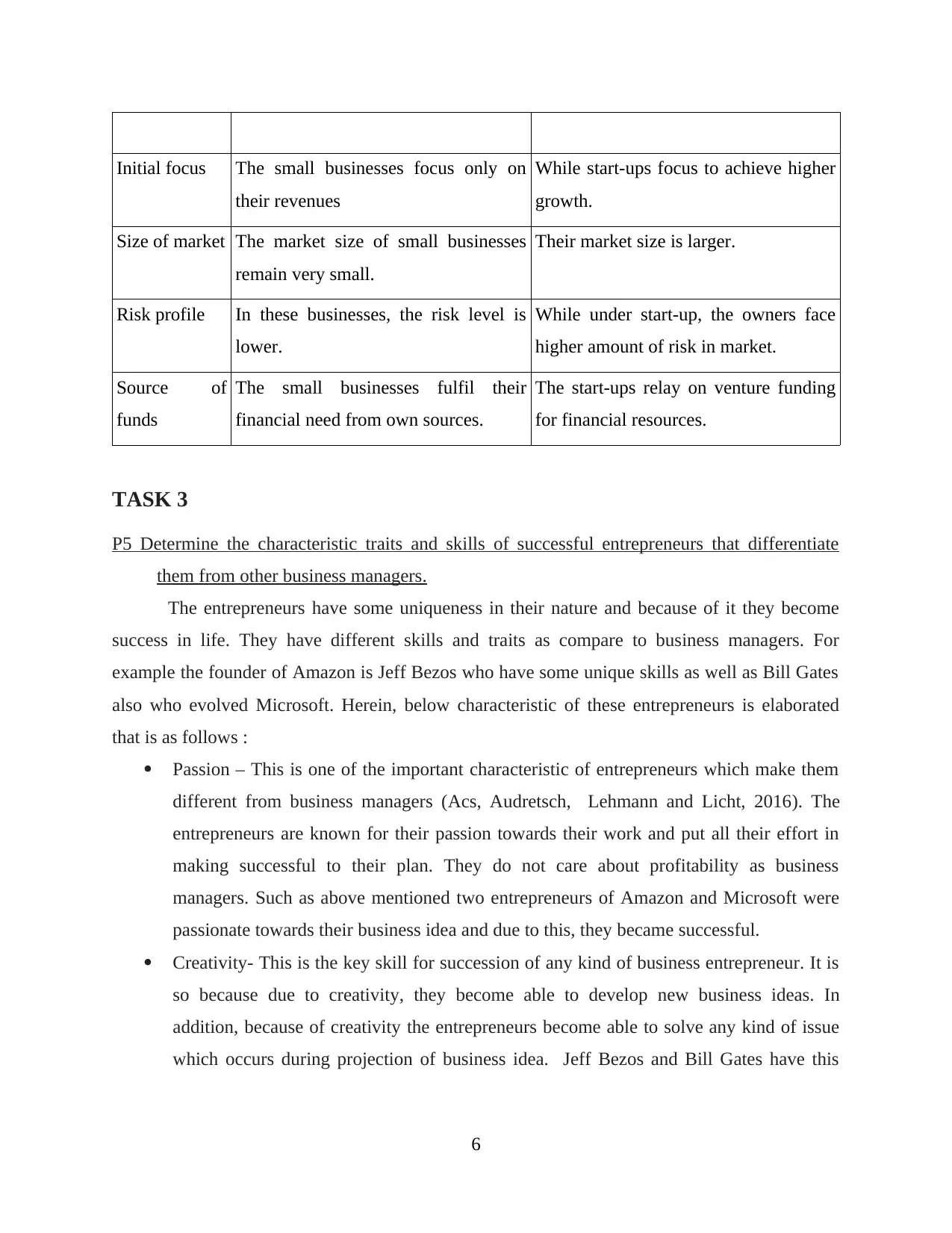
Initial focus The small businesses focus only on
their revenues
While start-ups focus to achieve higher
growth.
Size of market The market size of small businesses
remain very small.
Their market size is larger.
Risk profile In these businesses, the risk level is
lower.
While under start-up, the owners face
higher amount of risk in market.
Source of
funds
The small businesses fulfil their
financial need from own sources.
The start-ups relay on venture funding
for financial resources.
TASK 3
P5 Determine the characteristic traits and skills of successful entrepreneurs that differentiate
them from other business managers.
The entrepreneurs have some uniqueness in their nature and because of it they become
success in life. They have different skills and traits as compare to business managers. For
example the founder of Amazon is Jeff Bezos who have some unique skills as well as Bill Gates
also who evolved Microsoft. Herein, below characteristic of these entrepreneurs is elaborated
that is as follows :
Passion – This is one of the important characteristic of entrepreneurs which make them
different from business managers (Acs, Audretsch, Lehmann and Licht, 2016). The
entrepreneurs are known for their passion towards their work and put all their effort in
making successful to their plan. They do not care about profitability as business
managers. Such as above mentioned two entrepreneurs of Amazon and Microsoft were
passionate towards their business idea and due to this, they became successful.
Creativity- This is the key skill for succession of any kind of business entrepreneur. It is
so because due to creativity, they become able to develop new business ideas. In
addition, because of creativity the entrepreneurs become able to solve any kind of issue
which occurs during projection of business idea. Jeff Bezos and Bill Gates have this
6
their revenues
While start-ups focus to achieve higher
growth.
Size of market The market size of small businesses
remain very small.
Their market size is larger.
Risk profile In these businesses, the risk level is
lower.
While under start-up, the owners face
higher amount of risk in market.
Source of
funds
The small businesses fulfil their
financial need from own sources.
The start-ups relay on venture funding
for financial resources.
TASK 3
P5 Determine the characteristic traits and skills of successful entrepreneurs that differentiate
them from other business managers.
The entrepreneurs have some uniqueness in their nature and because of it they become
success in life. They have different skills and traits as compare to business managers. For
example the founder of Amazon is Jeff Bezos who have some unique skills as well as Bill Gates
also who evolved Microsoft. Herein, below characteristic of these entrepreneurs is elaborated
that is as follows :
Passion – This is one of the important characteristic of entrepreneurs which make them
different from business managers (Acs, Audretsch, Lehmann and Licht, 2016). The
entrepreneurs are known for their passion towards their work and put all their effort in
making successful to their plan. They do not care about profitability as business
managers. Such as above mentioned two entrepreneurs of Amazon and Microsoft were
passionate towards their business idea and due to this, they became successful.
Creativity- This is the key skill for succession of any kind of business entrepreneur. It is
so because due to creativity, they become able to develop new business ideas. In
addition, because of creativity the entrepreneurs become able to solve any kind of issue
which occurs during projection of business idea. Jeff Bezos and Bill Gates have this
6
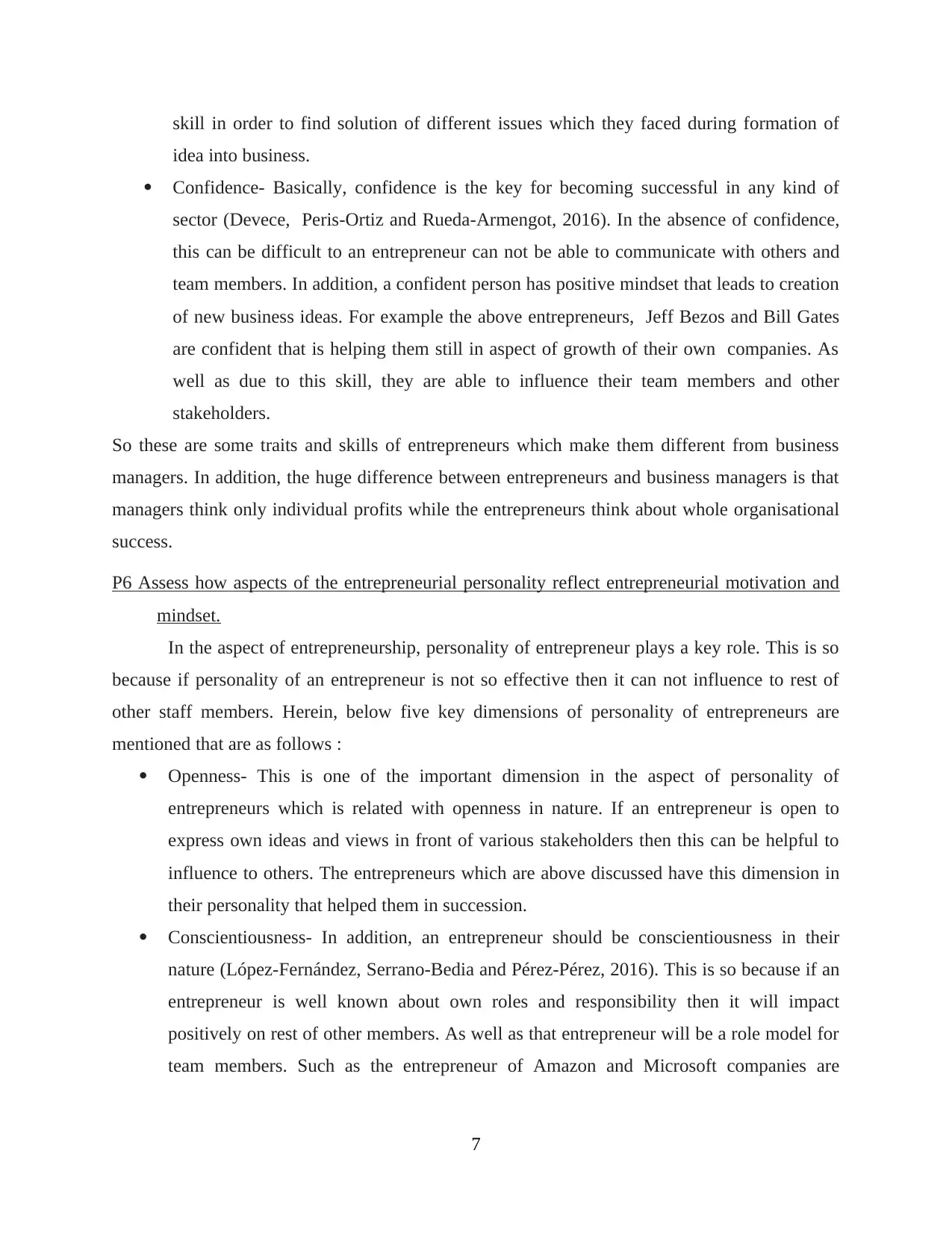
skill in order to find solution of different issues which they faced during formation of
idea into business.
Confidence- Basically, confidence is the key for becoming successful in any kind of
sector (Devece, Peris-Ortiz and Rueda-Armengot, 2016). In the absence of confidence,
this can be difficult to an entrepreneur can not be able to communicate with others and
team members. In addition, a confident person has positive mindset that leads to creation
of new business ideas. For example the above entrepreneurs, Jeff Bezos and Bill Gates
are confident that is helping them still in aspect of growth of their own companies. As
well as due to this skill, they are able to influence their team members and other
stakeholders.
So these are some traits and skills of entrepreneurs which make them different from business
managers. In addition, the huge difference between entrepreneurs and business managers is that
managers think only individual profits while the entrepreneurs think about whole organisational
success.
P6 Assess how aspects of the entrepreneurial personality reflect entrepreneurial motivation and
mindset.
In the aspect of entrepreneurship, personality of entrepreneur plays a key role. This is so
because if personality of an entrepreneur is not so effective then it can not influence to rest of
other staff members. Herein, below five key dimensions of personality of entrepreneurs are
mentioned that are as follows :
Openness- This is one of the important dimension in the aspect of personality of
entrepreneurs which is related with openness in nature. If an entrepreneur is open to
express own ideas and views in front of various stakeholders then this can be helpful to
influence to others. The entrepreneurs which are above discussed have this dimension in
their personality that helped them in succession.
Conscientiousness- In addition, an entrepreneur should be conscientiousness in their
nature (López‐Fernández, Serrano‐Bedia and Pérez‐Pérez, 2016). This is so because if an
entrepreneur is well known about own roles and responsibility then it will impact
positively on rest of other members. As well as that entrepreneur will be a role model for
team members. Such as the entrepreneur of Amazon and Microsoft companies are
7
idea into business.
Confidence- Basically, confidence is the key for becoming successful in any kind of
sector (Devece, Peris-Ortiz and Rueda-Armengot, 2016). In the absence of confidence,
this can be difficult to an entrepreneur can not be able to communicate with others and
team members. In addition, a confident person has positive mindset that leads to creation
of new business ideas. For example the above entrepreneurs, Jeff Bezos and Bill Gates
are confident that is helping them still in aspect of growth of their own companies. As
well as due to this skill, they are able to influence their team members and other
stakeholders.
So these are some traits and skills of entrepreneurs which make them different from business
managers. In addition, the huge difference between entrepreneurs and business managers is that
managers think only individual profits while the entrepreneurs think about whole organisational
success.
P6 Assess how aspects of the entrepreneurial personality reflect entrepreneurial motivation and
mindset.
In the aspect of entrepreneurship, personality of entrepreneur plays a key role. This is so
because if personality of an entrepreneur is not so effective then it can not influence to rest of
other staff members. Herein, below five key dimensions of personality of entrepreneurs are
mentioned that are as follows :
Openness- This is one of the important dimension in the aspect of personality of
entrepreneurs which is related with openness in nature. If an entrepreneur is open to
express own ideas and views in front of various stakeholders then this can be helpful to
influence to others. The entrepreneurs which are above discussed have this dimension in
their personality that helped them in succession.
Conscientiousness- In addition, an entrepreneur should be conscientiousness in their
nature (López‐Fernández, Serrano‐Bedia and Pérez‐Pérez, 2016). This is so because if an
entrepreneur is well known about own roles and responsibility then it will impact
positively on rest of other members. As well as that entrepreneur will be a role model for
team members. Such as the entrepreneur of Amazon and Microsoft companies are
7
⊘ This is a preview!⊘
Do you want full access?
Subscribe today to unlock all pages.

Trusted by 1+ million students worldwide
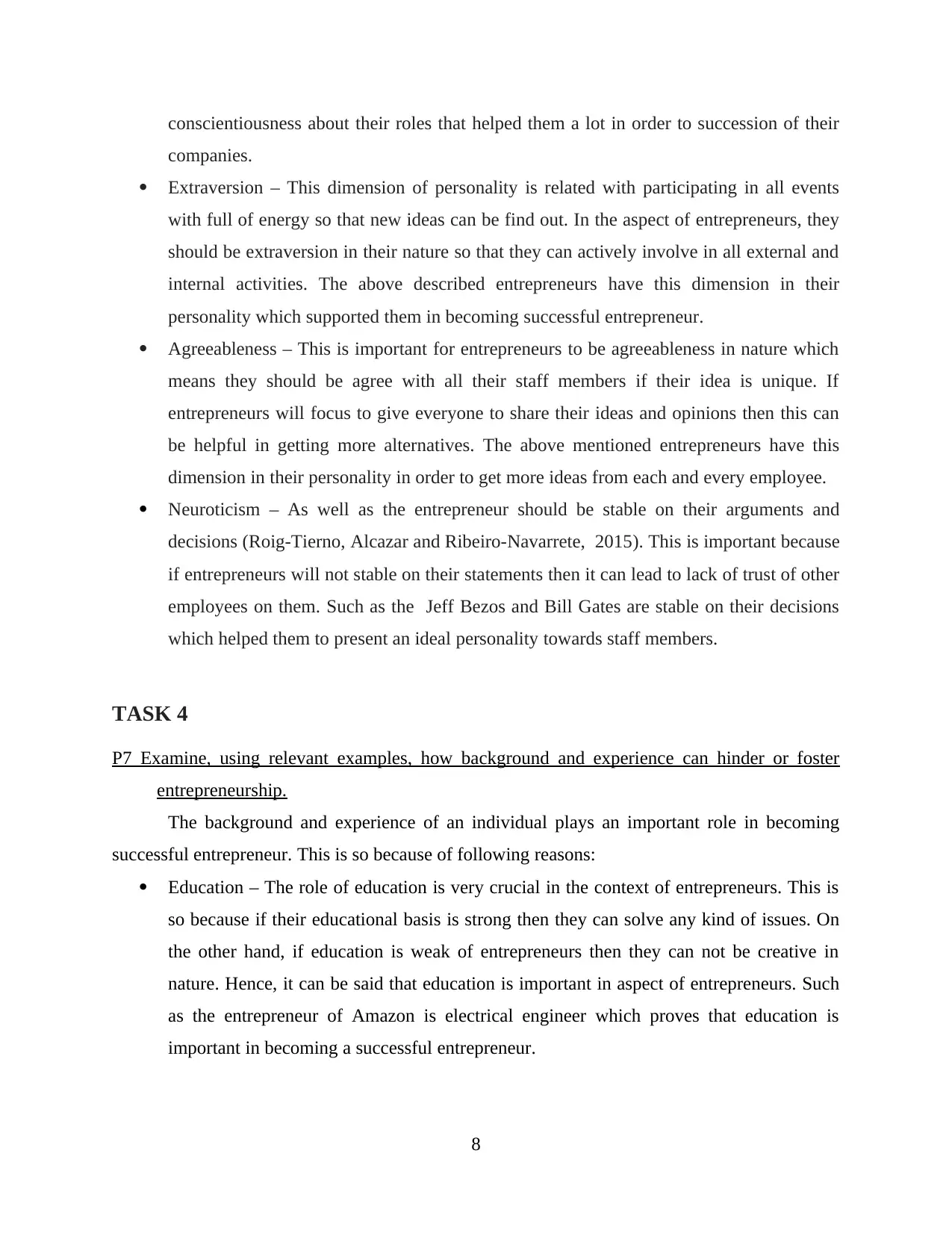
conscientiousness about their roles that helped them a lot in order to succession of their
companies.
Extraversion – This dimension of personality is related with participating in all events
with full of energy so that new ideas can be find out. In the aspect of entrepreneurs, they
should be extraversion in their nature so that they can actively involve in all external and
internal activities. The above described entrepreneurs have this dimension in their
personality which supported them in becoming successful entrepreneur.
Agreeableness – This is important for entrepreneurs to be agreeableness in nature which
means they should be agree with all their staff members if their idea is unique. If
entrepreneurs will focus to give everyone to share their ideas and opinions then this can
be helpful in getting more alternatives. The above mentioned entrepreneurs have this
dimension in their personality in order to get more ideas from each and every employee.
Neuroticism – As well as the entrepreneur should be stable on their arguments and
decisions (Roig-Tierno, Alcazar and Ribeiro-Navarrete, 2015). This is important because
if entrepreneurs will not stable on their statements then it can lead to lack of trust of other
employees on them. Such as the Jeff Bezos and Bill Gates are stable on their decisions
which helped them to present an ideal personality towards staff members.
TASK 4
P7 Examine, using relevant examples, how background and experience can hinder or foster
entrepreneurship.
The background and experience of an individual plays an important role in becoming
successful entrepreneur. This is so because of following reasons:
Education – The role of education is very crucial in the context of entrepreneurs. This is
so because if their educational basis is strong then they can solve any kind of issues. On
the other hand, if education is weak of entrepreneurs then they can not be creative in
nature. Hence, it can be said that education is important in aspect of entrepreneurs. Such
as the entrepreneur of Amazon is electrical engineer which proves that education is
important in becoming a successful entrepreneur.
8
companies.
Extraversion – This dimension of personality is related with participating in all events
with full of energy so that new ideas can be find out. In the aspect of entrepreneurs, they
should be extraversion in their nature so that they can actively involve in all external and
internal activities. The above described entrepreneurs have this dimension in their
personality which supported them in becoming successful entrepreneur.
Agreeableness – This is important for entrepreneurs to be agreeableness in nature which
means they should be agree with all their staff members if their idea is unique. If
entrepreneurs will focus to give everyone to share their ideas and opinions then this can
be helpful in getting more alternatives. The above mentioned entrepreneurs have this
dimension in their personality in order to get more ideas from each and every employee.
Neuroticism – As well as the entrepreneur should be stable on their arguments and
decisions (Roig-Tierno, Alcazar and Ribeiro-Navarrete, 2015). This is important because
if entrepreneurs will not stable on their statements then it can lead to lack of trust of other
employees on them. Such as the Jeff Bezos and Bill Gates are stable on their decisions
which helped them to present an ideal personality towards staff members.
TASK 4
P7 Examine, using relevant examples, how background and experience can hinder or foster
entrepreneurship.
The background and experience of an individual plays an important role in becoming
successful entrepreneur. This is so because of following reasons:
Education – The role of education is very crucial in the context of entrepreneurs. This is
so because if their educational basis is strong then they can solve any kind of issues. On
the other hand, if education is weak of entrepreneurs then they can not be creative in
nature. Hence, it can be said that education is important in aspect of entrepreneurs. Such
as the entrepreneur of Amazon is electrical engineer which proves that education is
important in becoming a successful entrepreneur.
8
Paraphrase This Document
Need a fresh take? Get an instant paraphrase of this document with our AI Paraphraser
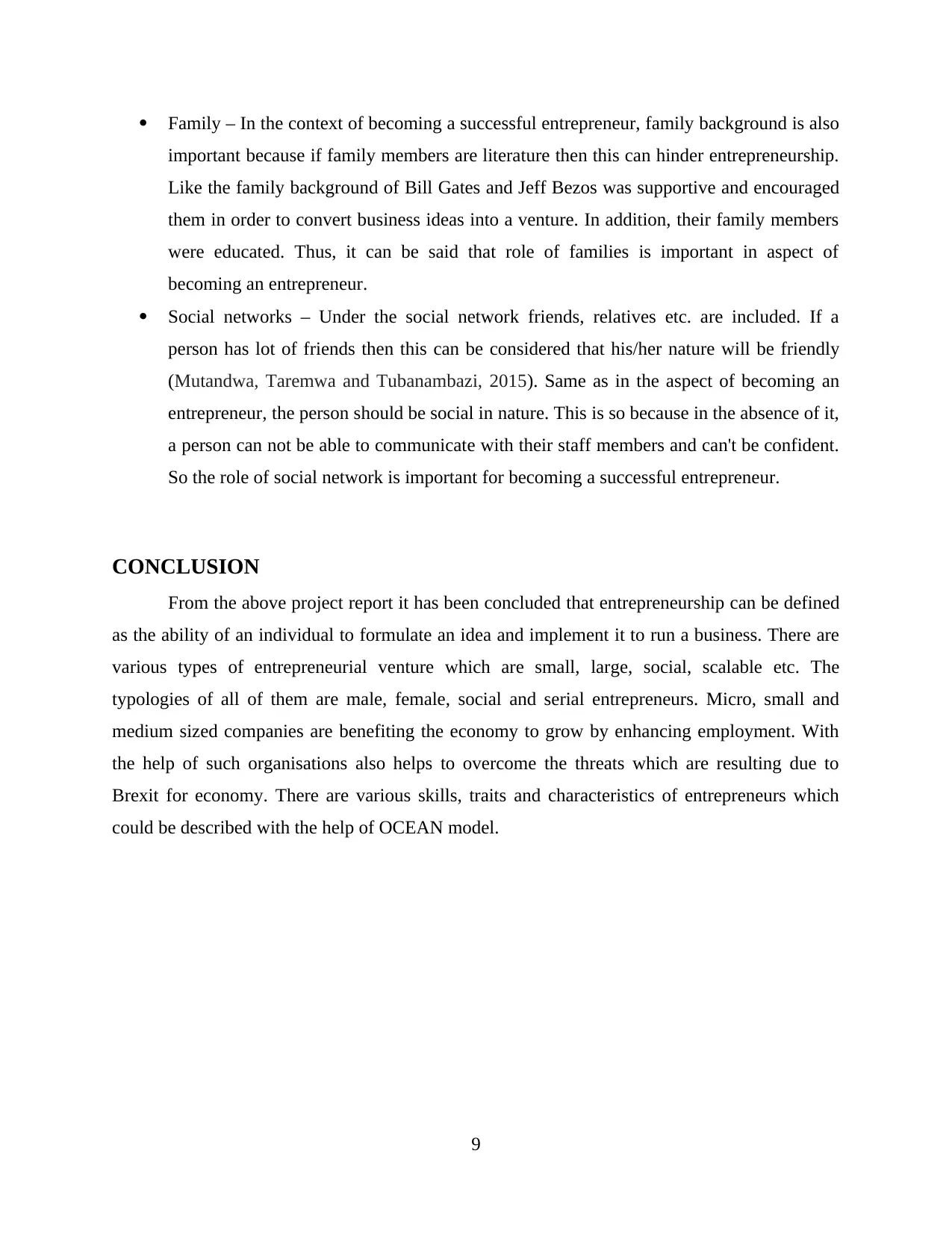
Family – In the context of becoming a successful entrepreneur, family background is also
important because if family members are literature then this can hinder entrepreneurship.
Like the family background of Bill Gates and Jeff Bezos was supportive and encouraged
them in order to convert business ideas into a venture. In addition, their family members
were educated. Thus, it can be said that role of families is important in aspect of
becoming an entrepreneur.
Social networks – Under the social network friends, relatives etc. are included. If a
person has lot of friends then this can be considered that his/her nature will be friendly
(Mutandwa, Taremwa and Tubanambazi, 2015). Same as in the aspect of becoming an
entrepreneur, the person should be social in nature. This is so because in the absence of it,
a person can not be able to communicate with their staff members and can't be confident.
So the role of social network is important for becoming a successful entrepreneur.
CONCLUSION
From the above project report it has been concluded that entrepreneurship can be defined
as the ability of an individual to formulate an idea and implement it to run a business. There are
various types of entrepreneurial venture which are small, large, social, scalable etc. The
typologies of all of them are male, female, social and serial entrepreneurs. Micro, small and
medium sized companies are benefiting the economy to grow by enhancing employment. With
the help of such organisations also helps to overcome the threats which are resulting due to
Brexit for economy. There are various skills, traits and characteristics of entrepreneurs which
could be described with the help of OCEAN model.
9
important because if family members are literature then this can hinder entrepreneurship.
Like the family background of Bill Gates and Jeff Bezos was supportive and encouraged
them in order to convert business ideas into a venture. In addition, their family members
were educated. Thus, it can be said that role of families is important in aspect of
becoming an entrepreneur.
Social networks – Under the social network friends, relatives etc. are included. If a
person has lot of friends then this can be considered that his/her nature will be friendly
(Mutandwa, Taremwa and Tubanambazi, 2015). Same as in the aspect of becoming an
entrepreneur, the person should be social in nature. This is so because in the absence of it,
a person can not be able to communicate with their staff members and can't be confident.
So the role of social network is important for becoming a successful entrepreneur.
CONCLUSION
From the above project report it has been concluded that entrepreneurship can be defined
as the ability of an individual to formulate an idea and implement it to run a business. There are
various types of entrepreneurial venture which are small, large, social, scalable etc. The
typologies of all of them are male, female, social and serial entrepreneurs. Micro, small and
medium sized companies are benefiting the economy to grow by enhancing employment. With
the help of such organisations also helps to overcome the threats which are resulting due to
Brexit for economy. There are various skills, traits and characteristics of entrepreneurs which
could be described with the help of OCEAN model.
9
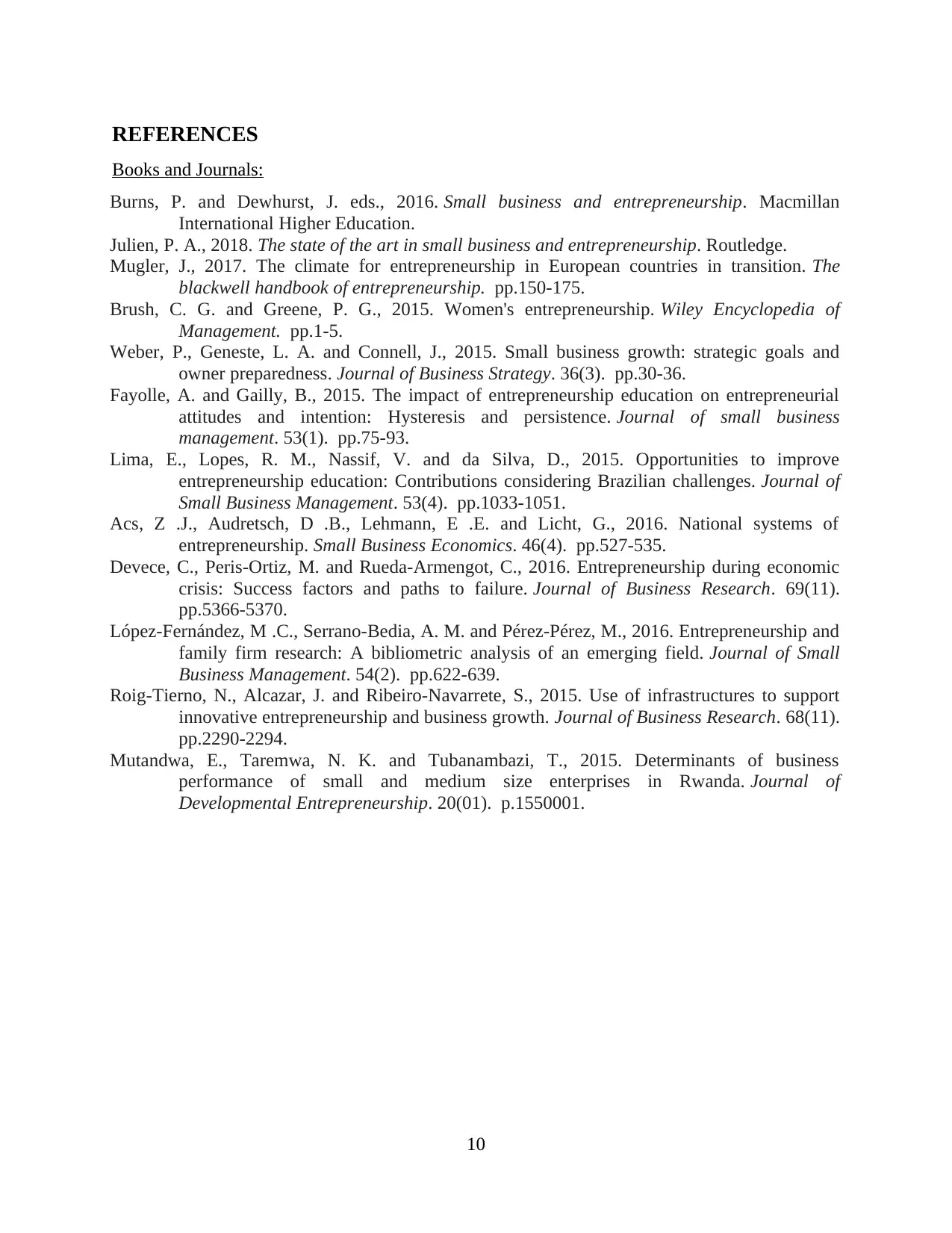
REFERENCES
Books and Journals:
Burns, P. and Dewhurst, J. eds., 2016. Small business and entrepreneurship. Macmillan
International Higher Education.
Julien, P. A., 2018. The state of the art in small business and entrepreneurship. Routledge.
Mugler, J., 2017. The climate for entrepreneurship in European countries in transition. The
blackwell handbook of entrepreneurship. pp.150-175.
Brush, C. G. and Greene, P. G., 2015. Women's entrepreneurship. Wiley Encyclopedia of
Management. pp.1-5.
Weber, P., Geneste, L. A. and Connell, J., 2015. Small business growth: strategic goals and
owner preparedness. Journal of Business Strategy. 36(3). pp.30-36.
Fayolle, A. and Gailly, B., 2015. The impact of entrepreneurship education on entrepreneurial
attitudes and intention: Hysteresis and persistence. Journal of small business
management. 53(1). pp.75-93.
Lima, E., Lopes, R. M., Nassif, V. and da Silva, D., 2015. Opportunities to improve
entrepreneurship education: Contributions considering Brazilian challenges. Journal of
Small Business Management. 53(4). pp.1033-1051.
Acs, Z .J., Audretsch, D .B., Lehmann, E .E. and Licht, G., 2016. National systems of
entrepreneurship. Small Business Economics. 46(4). pp.527-535.
Devece, C., Peris-Ortiz, M. and Rueda-Armengot, C., 2016. Entrepreneurship during economic
crisis: Success factors and paths to failure. Journal of Business Research. 69(11).
pp.5366-5370.
López‐Fernández, M .C., Serrano‐Bedia, A. M. and Pérez‐Pérez, M., 2016. Entrepreneurship and
family firm research: A bibliometric analysis of an emerging field. Journal of Small
Business Management. 54(2). pp.622-639.
Roig-Tierno, N., Alcazar, J. and Ribeiro-Navarrete, S., 2015. Use of infrastructures to support
innovative entrepreneurship and business growth. Journal of Business Research. 68(11).
pp.2290-2294.
Mutandwa, E., Taremwa, N. K. and Tubanambazi, T., 2015. Determinants of business
performance of small and medium size enterprises in Rwanda. Journal of
Developmental Entrepreneurship. 20(01). p.1550001.
10
Books and Journals:
Burns, P. and Dewhurst, J. eds., 2016. Small business and entrepreneurship. Macmillan
International Higher Education.
Julien, P. A., 2018. The state of the art in small business and entrepreneurship. Routledge.
Mugler, J., 2017. The climate for entrepreneurship in European countries in transition. The
blackwell handbook of entrepreneurship. pp.150-175.
Brush, C. G. and Greene, P. G., 2015. Women's entrepreneurship. Wiley Encyclopedia of
Management. pp.1-5.
Weber, P., Geneste, L. A. and Connell, J., 2015. Small business growth: strategic goals and
owner preparedness. Journal of Business Strategy. 36(3). pp.30-36.
Fayolle, A. and Gailly, B., 2015. The impact of entrepreneurship education on entrepreneurial
attitudes and intention: Hysteresis and persistence. Journal of small business
management. 53(1). pp.75-93.
Lima, E., Lopes, R. M., Nassif, V. and da Silva, D., 2015. Opportunities to improve
entrepreneurship education: Contributions considering Brazilian challenges. Journal of
Small Business Management. 53(4). pp.1033-1051.
Acs, Z .J., Audretsch, D .B., Lehmann, E .E. and Licht, G., 2016. National systems of
entrepreneurship. Small Business Economics. 46(4). pp.527-535.
Devece, C., Peris-Ortiz, M. and Rueda-Armengot, C., 2016. Entrepreneurship during economic
crisis: Success factors and paths to failure. Journal of Business Research. 69(11).
pp.5366-5370.
López‐Fernández, M .C., Serrano‐Bedia, A. M. and Pérez‐Pérez, M., 2016. Entrepreneurship and
family firm research: A bibliometric analysis of an emerging field. Journal of Small
Business Management. 54(2). pp.622-639.
Roig-Tierno, N., Alcazar, J. and Ribeiro-Navarrete, S., 2015. Use of infrastructures to support
innovative entrepreneurship and business growth. Journal of Business Research. 68(11).
pp.2290-2294.
Mutandwa, E., Taremwa, N. K. and Tubanambazi, T., 2015. Determinants of business
performance of small and medium size enterprises in Rwanda. Journal of
Developmental Entrepreneurship. 20(01). p.1550001.
10
⊘ This is a preview!⊘
Do you want full access?
Subscribe today to unlock all pages.

Trusted by 1+ million students worldwide
1 out of 12
Related Documents
Your All-in-One AI-Powered Toolkit for Academic Success.
+13062052269
info@desklib.com
Available 24*7 on WhatsApp / Email
![[object Object]](/_next/static/media/star-bottom.7253800d.svg)
Unlock your academic potential
Copyright © 2020–2025 A2Z Services. All Rights Reserved. Developed and managed by ZUCOL.


![Entrepreneurship and Small Business Impact Report - [University Name]](/_next/image/?url=https%3A%2F%2Fdesklib.com%2Fmedia%2Fimages%2Fwj%2Fd1f42599211847658d3fd556aa563fa5.jpg&w=256&q=75)


